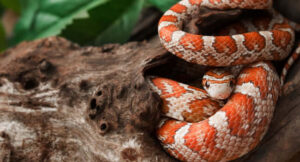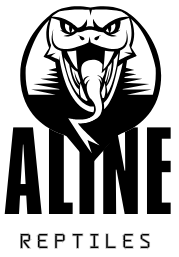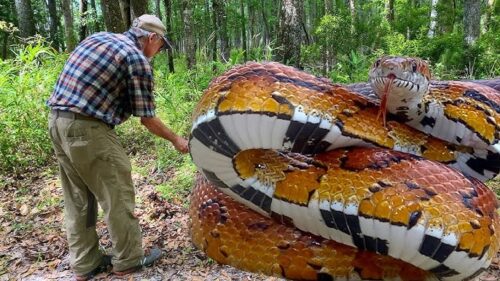Corn snakes are among the most popular pet reptiles for a reason. They are relatively easy to care for, docile in nature, and fascinating to observe. However, for many potential pet owners, one lingering question often arises: Does a corn snake bite hurt?
If you’re considering bringing a corn snake into your home—or you already have one—you might be a little apprehensive about the prospect of a bite. After all, snakes have teeth, and they are capable of delivering a sharp nip if they feel threatened or scared. But are corn snakes more likely to bite than other pets, and if they do bite, how much does it actually hurt? These are important questions that any future snake owner should consider.
In this guide, we’ll cover every aspect of corn snake bites, from how they happen to whether they hurt, and even what to do if you ever find yourself on the receiving end of a bite. Let’s dive into the world of corn snakes and explore what you can expect if you ever get bitten.
What is a Corn Snake?

Before addressing the pain aspect, it’s important to understand the corn snake itself. The corn snake (Pantherophis guttatus) is a species of rat snake native to the southeastern United States. They’re named “corn” snakes due to their pattern resembling the colors of dried corn. These snakes typically grow between 3 to 5 feet long and are known for their vibrant colorations and calm demeanor.
Corn snakes are non-venomous and are considered one of the best snakes for first-time reptile owners. Their relatively docile temperament makes them an ideal choice for someone looking to add a pet snake to their home. While they’re not aggressive, like all animals, they may bite if they feel threatened, startled, or if they’re simply acting out of instinct, especially when they are young or not yet accustomed to handling.
Understanding Corn Snake Behavior
Before we answer the pressing question about whether a corn snake bite hurts, let’s take a closer look at why corn snakes may bite in the first place. Understanding the reasons behind a corn snake bite will not only help you prevent it but will also help you gauge the likelihood of getting bitten in the future.
1. Defensive Bites
- Like many animals, corn snakes bite as a defense mechanism when they feel threatened. If a corn snake feels cornered or is being handled in a way that stresses it, it may lash out and bite to protect itself.
2. Fear or Stress
- Snakes, in general, are prey animals. If they feel unsafe, especially in an unfamiliar or stressful environment, they may bite in an attempt to escape. Proper handling is key to avoiding stress, so learning to recognize signs of discomfort in your snake is essential.
3. Feeding Response
- Some snakes, especially younger ones, might mistake a human hand for food. This is most likely to occur when you’re handling the snake after feeding time or during their active hunting hours. Understanding your snake’s feeding cycle and respecting their space can help prevent this type of biting incident.
Does a Corn Snake Bite Hurt?
Now, let’s get to the heart of the question: Does a corn snake bite hurt?
Physical Experience of a Bite
The pain associated with a corn snake bite can vary, but in most cases, it is not severe. Here’s what to expect when a corn snake bites you:
- Type of Bite: A corn snake bite typically doesn’t involve venom, as they are non-venomous constrictors. Instead, their bites are often compared to being nipped by a small animal or being scratched by a cat. They have sharp teeth, but their bite is usually shallow.
- Depth of the Bite: In most cases, a corn snake’s bite is not deep enough to cause severe pain or damage. The teeth are more likely to leave small puncture marks on your skin, which may bleed slightly but not enough to cause serious harm.
- Pain Sensation: The sensation of a corn snake bite is often described as more of a quick, sharp pinch rather than a prolonged pain. Depending on your pain tolerance, some people might not even feel much of a sting, while others might describe it as a mild discomfort.
Is It Comparable to Other Animal Bites?
If you’ve ever been bitten by a small pet like a hamster or gerbil, you’ll likely find that a corn snake’s bite is somewhat similar. The primary difference is that snakes have sharper, pointier teeth designed for grabbing and holding prey, not chewing or tearing. However, because corn snakes are not aggressive and are relatively small, the bite is usually minor and transient.
- Comparison to a Dog or Cat Bite: In contrast to the more intense pain that comes with a dog or cat bite, which can involve deeper puncture wounds, a corn snake bite is much milder. With snakes like corn snakes, it’s more of a “nip” than a “bite.”
- No Venom: One of the biggest reassurances when dealing with a corn snake is that they are non-venomous. So, even if you get bit, there’s no need to worry about venom entering your bloodstream, which can lead to swelling, infection, or other medical issues.
Pain Tolerance and Individual Experiences
Pain is subjective, and how much a corn snake bite hurts depends on various factors, such as:
- Skin Sensitivity: Some people have more sensitive skin than others, which could make the bite feel more painful than it would to someone else.
- Where the Bite Occurs: If the snake bites you on a sensitive area of your skin (e.g., the palm of your hand or the fingers), it may feel more painful than a bite to the forearm or another less sensitive part of your body.
- Size of the Snake: The size of the corn snake can also impact the intensity of the bite. While a hatchling corn snake may deliver a barely noticeable bite, a larger adult may be able to deliver a more significant bite, though still not anything to worry about compared to a venomous snake.
How to Prevent Corn Snake Bites

Now that we know that corn snake bites are generally mild and not harmful, it’s still important to do everything you can to avoid being bitten. Here are some tips for preventing bites and ensuring that your relationship with your corn snake stays positive:
1. Proper Handling
- Be calm and gentle when handling your corn snake. Avoid sudden movements that may startle it.
- Use both hands to support your snake’s body, allowing it to feel secure.
- Always wash your hands before and after handling your snake, as the scent of food or other animals could trigger a feeding response.
2. Respect Feeding Time
- After feeding your corn snake, give it time to digest the meal before handling it. Feeding times are prime opportunities for bites, as corn snakes may confuse your hand with prey.
- Avoid handling your snake for at least 24 hours after it has eaten to minimize the chances of triggering a bite.
3. Know Your Snake’s Body Language
- Pay attention to your snake’s behavior. If it seems agitated, hissing, or trying to escape, it might be better to give it some space.
- If your snake is hiding or acting skittish, don’t force handling. Let it adjust to its environment at its own pace.
4. Create a Comfortable Environment
- Make sure your corn snake’s enclosure is suitable for its needs. Stress from an uncomfortable habitat can trigger defensive behavior, including biting.
- Keep the temperature, humidity, and hiding spots appropriate for your snake to feel secure.
What to Do if a Corn Snake Bites You
While corn snake bites are usually mild, it’s still important to know what to do if it happens. Here are the steps to take immediately after a bite:
- Stay Calm: Don’t panic. Corn snakes bite because they feel threatened, not because they want to harm you. Handle the situation calmly to avoid further stressing the snake.
- Clean the Bite: Wash the wound with soap and water to reduce the risk of infection. Apply antiseptic to the area and cover it with a clean bandage.
- Monitor for Infection: Although rare, infections can occur. Keep an eye on the bite for a few days. If you notice excessive swelling, redness, or pus, consult a healthcare provider.
- Seek Medical Attention if Necessary: In very rare cases, if the bite is deep or if you experience unusual symptoms, it’s a good idea to seek medical attention.
Do Corn Snake Bites Have Any Long-Term Effects?
The good news is that most corn snake bites heal very quickly, and there are usually no long-term effects. As long as the bite is cleaned properly and doesn’t become infected, you can expect only minimal, temporary discomfort.
In some cases, you might experience a small scar, but this is rare. More often, any swelling or bruising will subside within a few hours or days.
Conclusion
Does a Corn Snake Bite Hurt? Corn snakes are incredibly safe pets to keep, and their bites—though sometimes startling—are rarely dangerous or painful. In most cases, a corn snake bite feels like a mild pinch and doesn’t cause lasting discomfort. As long as you handle your snake with care, respect its space, and learn to recognize its behavior, you can typically avoid being bitten altogether.
These friendly, non-venomous reptiles make fantastic pets for both beginners and experienced owners. If you’re worried about the possibility of a bite, rest assured it’s not a reason to shy away from welcoming a corn snake into your life. With proper care and handling, you’ll enjoy a rewarding and safe companionship with these fascinating creatures.

